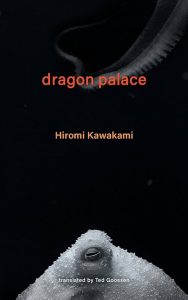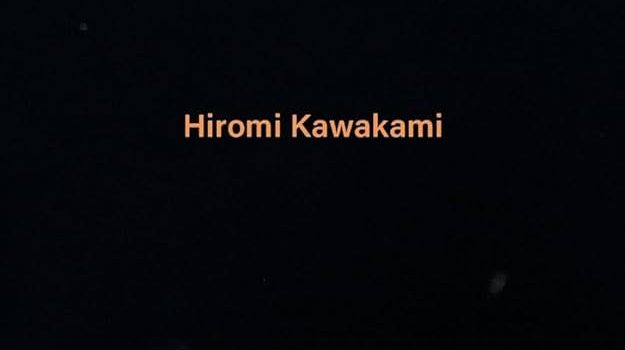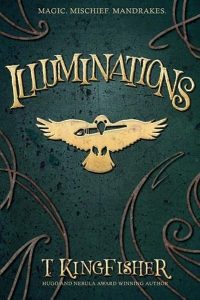Ian Mond Reviews Dragon Palace by Hiromi Kawakami
 Dragon Palace, Hiromi Kawakami (Stone Bridge Press 978-1-73762-535-3, $18.95, 160pp, tp) September 2023.
Dragon Palace, Hiromi Kawakami (Stone Bridge Press 978-1-73762-535-3, $18.95, 160pp, tp) September 2023.
In my review of David Connor’s debut Oh God, The Sun Goes, I referred to what I’m now calling the “absurdist sweet spot,” those stories that blend the poignant with the surreal. One author who I said hit that sweet spot is Japanese writer Hiromi Kawakami, whose previous collection to be translated into English, People from My Neighbourhood, I found to be as tender as it was quirky. The eight stories that comprise Kawakami’s latest collection, Dragon Palace (translated by the talented Ted Goossen), may not always be as tender as the vignettes in People from My Neighbourhood; however, they’re still wonderfully odd, discomfiting, lewd, and very, very human.
The opening story, “Hokusai”, features a recurring motif throughout the collection: the transformation of humans into animals and vice versa. In this case, our depressed narrator meets a man on the beach who turns out to be an octopus. As they embark on a pub crawl (with our narrator paying the way), the octopus (who mostly holds his human shape) recalls his two centuries as a land dweller, a rags-to-riches-to-rags story involving sweet potatoes, the seduction of multiple women, and a wildly successful business built on the back of training crickets to sing. On the surface, we’re presented with an extravagant, funny, and bawdy tale. But it’s a story with a nasty edge that speaks to toxic masculinity. The narrator’s inadequacy, especially when it comes to meeting women, is amplified by the octopus’s misogynistic treatment of women, who are dismissed as “soft, cruel, delightfully thoughtless creatures.” Kawakami pulls off a similar effect in the title story “Dragon Palace”. It begins with the narrator’s great-grandmother, Ito, paying a visit. As with “Hokusai”, our protagonist plays second fiddle to Ito, whose story dominates the narrative. It’s the tale of a goddess who dreamt of the Buddha as a young girl, who has spent her life “uttering words that came to her from the spirit realm,” who is short, barely reaching her great-granddaughter’s knee, and who was once the leader of a sex cult. And just like “Hokusai”, the fluidity and essential weirdness of the piece doesn’t obscure the tale’s darker strains about the challenges and expectations of motherhood.
“Hokusai” and “Dragon Palace” are stories about outsiders, the octopus and Ito, compelled to move from place to place, never fitting in, even when they’re operating a successful business or leading a cult. That overwhelming sense of isolation, of being on the outside, is embodied in Izumi, the protagonist of “Kitchen God”, who is married with children but ostensibly lives alone, peeling the stucco off her kitchen wall. Her only distraction comes from the appearance of a kitchen god (who admonishes Izumi for eating the plaster), the brief thrill she gets from shoplifting, the older man she’s started seeing and the ever-present threat of weasels plaguing her apartment building. At one point, the kitchen god asks Izumi if she is happy and, rather tellingly, she doesn’t know, having “never given the question a thought.” Where the shapeshifting octopus of “Hokusai” is a bit of a cad, the opposite can be said of the titular protagonist of “Mole”. Working alongside humans (who he knows loathes his species), the mole and his wife have opened their burrow to people who have lost “the energy to stay alive,” shrink in size, and eventually either die or regain the strength to continue living. Here, we have an outsider who is a portrait of kindness and love.
“Fox’s Den” is another bright spot in the collection, a love story between a caregiver and her elderly client, Shota. (I should note that the narrator rescinds her role as Shota’s caregiver once she decides to live with him). It’s a hilarious, touching story about an older man who shrinks to the size of a locust, has strong views about ancient turds, and enjoys an erotic magazine (especially those with a scatological bent). Compare the unorthodox but touching love story of “Fox’s Den” to the relationship depicted in “Sea Horse”. It’s the collection’s final piece, acting as a mirror to the first story, “Hokusai”. Again, we have a sea creature mingling among humans, but this time, a sea horse transforms into a woman after a fisherman captures her. Where the octopus is a womanizer the sea horse is abused, handed over from husband to husband, most of whom, as she chillingly informs us, “treated me well.” It’s a disturbing but effective story to end the collection, one that adds an unseemly undertone to the octopus’s sexism in “Hokusai”, where women are viewed as “thoughtless” commodities to be taken advantage of, or in the case of the “Sea Horse”, bought and sold. The stories in Dragon Palace use the absurd to shine a light on the disaffected parts of ourselves, our feelings of isolation and estrangement in a world where kindness and love seem in short supply.
Ian Mond loves to talk about books. For eight years he co-hosted a book podcast, The Writer and the Critic, with Kirstyn McDermott. Recently he has revived his blog, The Hysterical Hamster, and is again posting mostly vulgar reviews on an eclectic range of literary and genre novels. You can also follow Ian on Twitter (@Mondyboy) or contact him at mondyboy74@gmail.com.
This review and more like it in the November 2023 issue of Locus.
 While you are here, please take a moment to support Locus with a one-time or recurring donation. We rely on reader donations to keep the magazine and site going, and would like to keep the site paywall free, but WE NEED YOUR FINANCIAL SUPPORT to continue quality coverage of the science fiction and fantasy field.
While you are here, please take a moment to support Locus with a one-time or recurring donation. We rely on reader donations to keep the magazine and site going, and would like to keep the site paywall free, but WE NEED YOUR FINANCIAL SUPPORT to continue quality coverage of the science fiction and fantasy field.
©Locus Magazine. Copyrighted material may not be republished without permission of LSFF.








